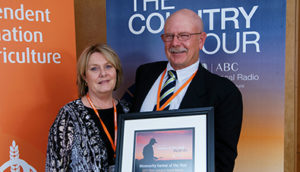Read the latest information on
Foot-and-mouth disease
 Peter and Sandra Young’s holistic approach to biosecurity has rendered them champions of the Australian agricultural industry and finalists in the inaugural Australian Biosecurity Farmer of the Year Awards.
Peter and Sandra Young’s holistic approach to biosecurity has rendered them champions of the Australian agricultural industry and finalists in the inaugural Australian Biosecurity Farmer of the Year Awards.
On-farm biosecurity protects livelihoods, industries and communities. This is a major reason why it has long been at the forefront of operations at the Sunshine Coast’s Birdwood Nursery Fruit Trees.
Birdwood Nursery Fruit Trees is a production nursery situated on 60 acres in Woombye, Queensland. The nursery was initially purpose built by owners Peter and Sandra to produce avocado trees tested free from root rot disease (Phytophthora cinnamomi).
The Australian Biosecurity Farmer of the Year Awards, held last September and proudly supported by Plant Health Australia (PHA), promoted an up-to-the-minute, positive image of farmers while recognising producers who inspire other farmers and encourage investment in Australian agriculture.
Peter and Sandra’s commitment to improving biosecurity practices on their property demonstrates a significant return for their efforts and highlights the fact that biosecurity makes good business sense.
Following their lead, it is hoped that others too will see the value of implementing good biosecurity practices on their properties and to find out more about what can be done to manage pest, disease and weed threats.